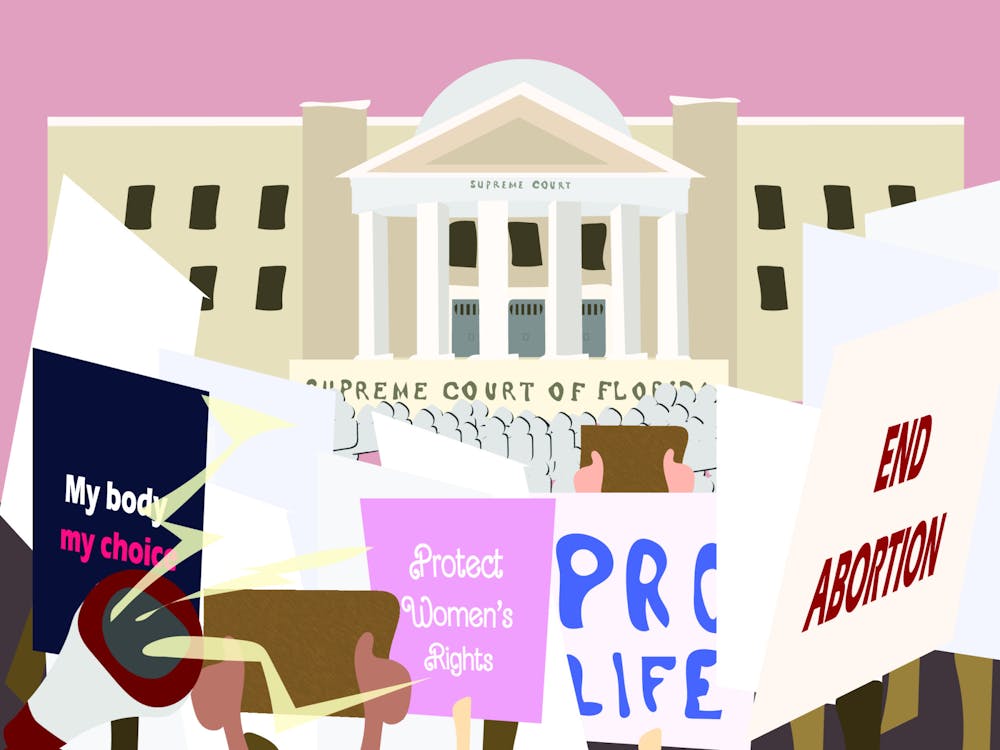Over a year since the Supreme Court overturned Roe v. Wade, Florida lies at a tipping point that will decide the future of reproductive care in the state.
The Florida Supreme Court heard oral arguments Sept. 8 for the landmark case Planned Parenthood of Southwest and Central Florida v. State of Florida, which challenges the 15-week ban on abortion in Florida’s House Bill 5.
Although the case has not reached a verdict, if the court rules in favor of the state, a six-week ban signed into law by Gov. Ron DeSantis in April will go into effect within 30 days.
Five of the court’s seven justices were appointed by DeSantis, who is an adamant supporter of HB 5’s restrictions on abortion. The remaining two were also appointed by a Republican governor.
Local and statewide reproductive health providers and advocacy organizations are leading efforts to offer women abortion care resources in the face of uncertainty.
Statewide restrictions
Florida providers, like Dr. Kanthi Dhaduvai, grapple with what it means to have limits on their practice as the legality and morality of abortion care are balanced on a scale.
“It is frustrating for me because I can't provide the compassionate, evidence-based care that I've been trained to provide,” Dhaduvai said.
Dhaduvai, an abortion provider at the Planned Parenthood Jacksonville Health Center, said abortion is often a siloed issue, so people forget it is an important aspect of reproductive health care.
Apart from the current and pending limitations on abortion, there is also a 24-hour waiting period for the procedure established in the Florida statutes. The law requires a patient to meet with a physician who will perform an abortion at least 24 hours before the procedure to discuss its risks and health effects.
The rule presents a time-consuming obstacle for patients who have to take time off work, make accommodations and schedule more than one appointment to get abortion care, Dhaduvai said.
Dhaduvai worries that a six-week ban on abortion care in Florida, combined with the existing 24-hour waiting period, will make it virtually impossible to access the service.
“It's called the six-week ban but in reality, this is like a near-total abortion ban in the state of Florida, because six weeks is very, very early in the pregnancy,” she said.
If their period is regular, most people find out they are pregnant two weeks after a missed period, Dhaduvai said, and even then, a lot of them don’t find out until after six weeks.
Florida’s 15-week ban is one of the most lenient in the Southeast of the U.S., with nearby states like Georgia and South Carolina having six-week bans, and Alabama maintaining a total ban.
Planned Parenthood clinics in Florida have seen an influx of out-of-state patients who have traveled to get an abortion, Dhaduvai said, especially since the overturn of Roe.
There have been over 4,600 abortions for out-of-state residents as of Sept. 2, according to data from the Florida Agency for Health Care Administration.
“Patients who are beyond the limit of the state need to, if they have the resources, travel many many hours,” Dhaduvai said. “I’ve seen the way this takes an emotional toll on patients.”
Local abortion care
Alachua County and Gainesville abortion and health care providers continue to work under the current ban, offering a variety of resources for reproductive health care.
Gainesville has two medical centers that perform abortions: the All Women’s Health Center of Gainesville and the Bread and Roses Women’s Health Center.
The Planned Parenthood health center in Gainesville is also only two miles from UF’s main campus.
Michelle Quesada, the vice president of communications, brand and marketing for Planned Parenthood of South, East and North Florida, shared the organization’s concern about HB 5 and efforts to protect abortion access, she said in a statement to The Alligator.
“[The bill] has forced many people to either travel long distances out of state or to carry pregnancies against their will, subjecting them to the life-altering and sometimes life-threatening consequences,” Quesada wrote.
The center offers low-cost STI testing, HIV/STI treatment, contraception, emergency contraception, well-person exams, pregnancy tests and services, abortion referrals and mental health services, among other resources, Quesada wrote.
For preventive care, Quesada said the health center also offers free medical education to school-aged teens on contraception, sexually transmitted infections, teen pregnancy and abstinence.
‘Pregnancy resource centers’
Local religious groups like the Saint Augustine Church and Catholic Student Center aim to offer women alternatives to abortions at their “pregnancy resource centers.”
May Oliver, director of the Human Life and Dignity Office at the Saint Augustine diocese, said their organization supports pregnancy care through resource centers, maternity homes and post-abortion counseling in 17 Florida counties.
“Pregnancy resource centers” or “crisis pregnancy centers” have been highly criticized by pro-choice activists. Organizations like Planned Parenthood claim the facilities deliver inaccurate information on reproductive health, lack proper medical resources and focus on tactics to discourage abortions.
Although the centers mostly provide counseling and guidance for pregnant women, some of the centers also offer ultrasounds and pregnancy and STI testing, Oliver said.
Oliver said she believes some of the alternatives to abortion at the centers are hidden from patients because of criticism.
“[Adoption] is a very positive, positive thing,” Oliver said. “But our culture has vilified the whole adoption discussion I think.”
There are four pregnancy resource centers in Alachua County that fall under the diocese: A Woman’s Answer Medical Center, Caring Choices Pregnancy Services, Community Pregnancy Clinics and Sira.
Unlike abortion clinics, these centers work under the Florida Pregnancy Support Services Program, which is funded by the state’s Department of Health.
Funds come from a state grant that increased in July from $4.45 million to $25 million. There are 192 centers operating in Florida.
Planned Parenthood is funded on a federal and state level through Medicaid reimbursements and Title X grants. The South, East and North Florida branch reported revenue of roughly $1.8 million from grants in 2020.
Abortion ballot initiative
Aside from their efforts on the court to win the case, pro-choice activist groups like Planned Parenthood, Florida Rising and ACLU came together for a statewide campaign called Floridians Protecting Freedom.
The initiative aims to add to the 2024 election ballot a state constitutional amendment that will limit government interference with abortion. The group is advocating to get the amendment on the ballot through a petition signature collection.
Lauren Brenzel, the campaign director for FPF, shared in a statement to The Alligator that the goal of the campaign is to return the decision on abortion to Florida voters.
“Regardless of the court’s ruling, we are working to give voters the opportunity to decide for themselves whether we should limit government interference in personal medical decisions,” Brenzel said.
FPF announced Sept. 6 that the initiative gained enough verified signatures to qualify for a state Supreme Court review, according to a press release.
Contact Valentina at vsandoval@alligator.org. Follow her on Twitter @valesrc.
Valentina Sandoval is a fourth-year journalism major and the Summer 2024 Engagement Managing Editor. Whenever she's not writing, she's expanding her Animal Crossing island, making Spotify playlists or convincing someone to follow her dog on Instagram.





